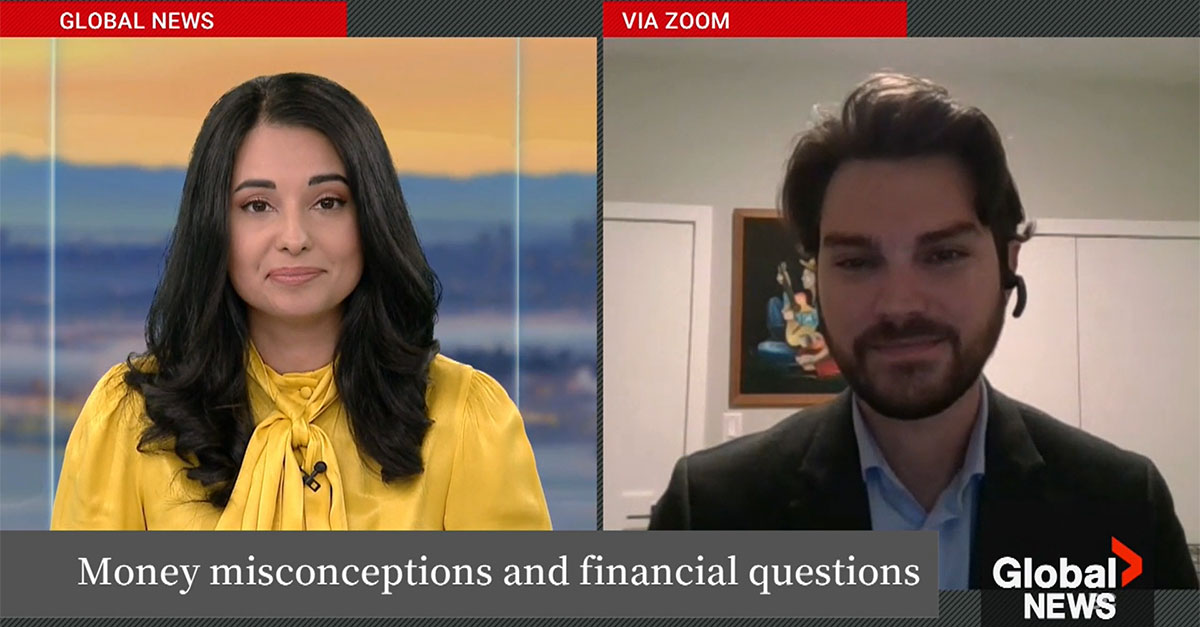It’s hard to ignore the fact that inflation and interest rates are on the rise, and with Canadians experiencing their sixth rake hike since March 2022, there’s no doubt money is on everyone’s mind right now—but what are the questions that are causing Canadians to lose sleep over their finances?
In partnership with Global Morning News, we’ve uncovered the four biggest money stressors that are keeping people up at night. They are:
- Managing money with a significant other
- Investment basics such as the difference between an RRSP and TFSA
- Figuring out how to tackle paying down debt
- Uncertainty around estate planning
In order to address these concerns, we’ve answered your questions below and also offer further reading on each topic to make sure you feel confident about your path forward. And maybe get some more sleep.
How do I talk to my partner about money?
If you don’t always see eye-to-eye with your significant other on financial matters, it doesn’t have to be a sore spot. Though finances can be the leading cause of stress in relationships, conversations with your partner about spending habits, earnings expectations, and other money-related topics can be productive.
Remember, there is no one size fits all approach when it comes to managing your finances in any partnership, and there are many ways to “slice the pie.”
For example, there are a number of reasons why someone may want to separate finances—independence being a big one. On the flip side, a joint account is a fantastic tool when it comes to managing monthly fixed expenses within a partnership—like your mortgage or rent, utilities, food, and childcare.
There are also benefits to investing together to take full advantage of different tax rates. Overall it’s important to remember that every individual has their own risk tolerance, time horizons, and goals.
Transparent conversations can help you land on what feels right in your partnership and find a balance between sticking to collaborative financial goals and honouring what’s important to you as an individual.
To build more trust with your partner and achieve the financial wellness you both deserve, read these six strategies for talking about money with your partner.
Which is better for me? An RRSP or a TFSA?
The great thing about RRSPs and TFSAs is that the aim of both is to create a savings plan that works for you. Whether it’s for retirement or for a big purchase, it’s good to weigh which option is best for your current situation while also considering the needs of your future self.
Here are a few things that differentiate the TFSA and the RRSP.
RRSPs are a long term investment tool and a TFSA is a short term investment tool. When determining the best fit between the two—the choice becomes about timeline, goals and considerations such as how much room each has annually. And, there is no reason you can’t have both to meet various goals you might have.
Age limits
There’s no minimum age for starting an RRSP, as long as you’re earning an income. However, you can only contribute to your RRSP until the end of the year in which you turn 71.
With a TFSA, you can’t open one until you’re at least 18 years old, but there’s no maximum age limit when it comes to contributing to your TFSA.
Taxation
TFSA contributions are not tax-deductible, while RRSP contributions – within limits – can be deducted to reduce your taxable income in the year that you make the contribution. The reason there’s a rush to make your RRSP contribution by the contribution deadline (next year it’s March 1) is to ensure a tax break from the previous year. TFSA contributions don’t offer the same immediate tax break.
However, an RRSP shelters your income only temporarily from the taxman. When income is withdrawn – even if it’s years down the road after being converted to an RRIF – it’ll be taxed. With a TFSA, that income remains tax-free even when you withdraw it.
For more information on the differences between RRSPs and TFSAs, and which ones may be better for you, read the full article here.
How should I be managing my debt?
There’s no denying that a lot of us can carry shame around our debts from time to time, and paying those balances down is a challenge that so many Canadians are facing today.
When it comes to paying down your debt, employing a few key strategies can be integral in helping you get ahead, and here are two popular approaches to tackling debt head on.
There’s the “debt avalanche method,” which involves paying the debt with the highest interest rate first while making minimum payments on your other debts.
On the flip side, there’s the “debt snowball method”—aggressively paying off the smallest amount of money owed first and making minimum payments on the rest. Some find this method more motivating to wipe out debt.
For more information on how to pay down your debt, this article answers 8 common questions to do with debt repayment and offers advice on how to help you get back in the black.
How can estate planning help me prepare for unforeseeable life circumstances?
It’s important to plan for unforeseeable circumstances in life, no matter how uncomfortable it may be. With this being said, 57% of Canadians don’t have a will—and yet a will is integral to your financial planning for so many reasons.
Especially when it comes to debt. If the debt a person holds outweighs their investments, or “other assets,” that debt is to be paid first and an estate may become insolvent—which means, in Canada, your debt will not be inherited.
Whether it’s creating your will, acquiring life insurance, naming your beneficiaries on investments, or other components of estate planning—a trusted partner can help you with this process, and will help provide clarity around next steps.
For advice on what you should know about the process and why it’s important to tend to it now, read our secrets to smart estate planning guide.



